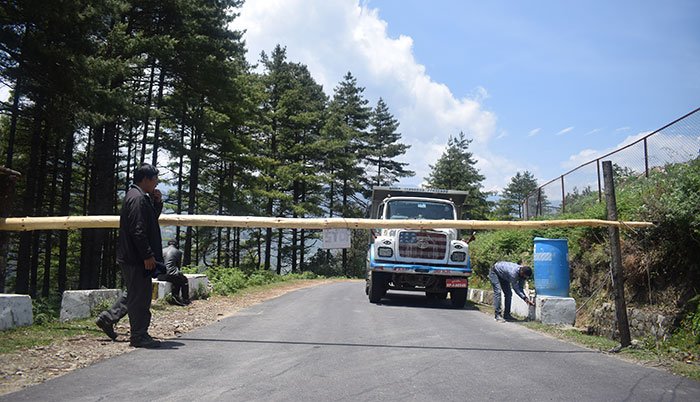Rajesh Rai | Chukha
Communities in Chukha have taken the responsibility of Covid-19 prevention in their own hands. Entry to their villages is strictly monitored.
Each village has raised a wooden gate as entry point on the farm roads or gewog roads that lead to the village. Men and women volunteer on a rotational basis to guard the entry points.
On Monday, it was Lhenchup Dema, 45 and Dawa Lham, a 16-year-old student’s turn to guard the entry point to their village, Lobneykha in Chapcha gewog.
A diversion of a 4km farm road from the previous Thimphu-Phuentsholing (national) highway, between Bunagu and Tanalung, connects the serene Lobneykha.
Under a makeshift shelter near the gate, Lhenchup Dema and her teenager partner stay quiet but vigilant. They have registered nine people by 11am.
“Unfamiliar faces are not allowed,” Lhenchup said. “We will have to consult with the village tshogpa to let them pass.”
Not even the locals are spared.
Every detail, including the travel history of the villagers and vehicles are recorded. People also have to wash hands before they proceed.
After 7pm, the gate is closed, and not a single soul gets to pass. A contact number of a focal person is left at the gate so that people can call in case of emergency after 7pm.
Lhenchup Dema said that locals only keep moving. Most go to the Tsimasham town.
At Tanalung, where the check post stood prior to Damchu bypass, the task is even harder. Four men guard the location for 24 hours before passing the job to another group. They start from 6pm and conclude their shift the same time next day.
Phuntsho, who was on his shift at Tanalung on Monday, said vehicles use the old highway despite having the Damchhu bypass. Most were from the localities of Chapcha.
On May 17, Tanalung volunteers recorded movement of 23 vehicles. For those headed towards the capital, the team also has facilitated the Druk Trace.
Karma Gyeltshen, 66, had taken the job to note the details of the commuters on a register. Covid-19 is the last thing he would want anywhere near his home.
A gate has also been fixed on the highway below Chapcha gewog office. This point is also guarded round the clock. The gewog caretaker’s house, nearby, is used to rest.
Namgyel, who was on his volunteer duty, said there haven’t been much problem.
“Only a few people have questioned us,” he said.
Chapcha Gup Tobgay said while people in the town and shopkeepers used Druk Trace, not many in the villages have mobile phones to run the app.
“So we decided this method to monitor and record the visitors,” he said.
Tobgay said gates were erected in six chiwogs. Because many people visited the temples and monasteries in the villages, this was the only method to keep their details, he said.
Chukha dzongkhag tshodu’s (DT) chairperson, Tshering Nidup, who is also the Bongo gup said all the gewogs were following this measure.
“Villagers are considered safe but there are other people who come to the villages,” he said. “It is important to keep details of new people and vehicles.”
The chairperson said that those who return from quarantine centres were also advised to stay put in their homes for a week.
In places where there are no gates, the chairperson said that observers and focal persons were identified to keep track of visitors.
“We cannot depend entirely on our police, desuups, and government officials for our safety,” Tshering Nidup said. “Covid-19 is everybody’s responsibility.”
At the entry point at Lobneykha, Lhenchup Dema and Dawa Lham have not had a visitor. It is 3pm and they have had their lunch.
Dawa Lham has brought along a book to read, to kill time.


